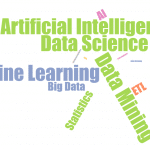Businesses plan to use more AI and machine learning in cybersecurity this year -- even though they don't understand it

The use of more artificial intelligence to improve security has been touted for a while. New research from Webroot reveals that a majority of business are now actively exploring the technology.
It finds 71 percent of businesses surveyed in the United States plan to use more artificial intelligence and machine learning in their cybersecurity tools this year. However, a worrying 58 percent say that aren't sure what that technology really does.
Take your marketing automation further with AI

It’s been said that artificial intelligence is the future, but I’d argue that AI is very much a thing of the here and now. It’s playing an increasingly significant role in marketing efforts, and is taking marketing automation to the next level. And during an era when customers are demanding fast and hyper-personalized service, AI-based technologies couldn’t be more critical.
AI-based technologies bolster marketing automation efforts through personalized interactions. Your business can benefit on a multitude of fronts by embracing these game-changing advancements.
The sci-fi of AI versus its intriguing reality

In sci-fi movies, machines work in choreographed grace, hovering gently, waddling cutely, and performing flawlessly. Computer interfaces seem minimalist with their floating touch interfaces and bluish color palettes. Wakanda of Black Panther, Cloud City in Star Wars, and New York City of The Fifth Element function so beautifully.
Here’s my question: Where the hell are all their IT people?!!
Fake news: OpenAI's 'deepfakes for text', GPT2, may be too dangerous to be released

OpenAI -- a company backed by Elon Musk -- has created an artificial intelligence system called GPT2 that's capable of writing fake news. The system is also capable of generating works of fiction, and it has been described as being so dangerous that it may not be publicly released.
The stories written by GPT2 have been called "deepfakes for text" and can be generated by feeding the system just a few words. The style is far more sophisticated than most AI-generated text, and the news stories it can generate are so convincing that there are serious concerns about the potential for misuse.
Microsoft brings AI-powered background blurring to Skype

A few months after adding background blurring to its Teams tool, Microsoft has brought the same option to Skype on the desktop.
The feature serves two purposes. Firstly it helps to focus attention on the person that is speaking, but secondly -- and perhaps more importantly -- it hides any untidiness (or secrets) that may be going on behind the speaker. It's another push from Microsoft to move people away from Skype Classic to Skype 8.
What's in a name? Artificial Intelligence or Data Science?

If you are like me, there is a good chance that you are confused as well about the most recent terminology to use in the field of data science … pardon, artificial intelligence … no, I mean data science. No, I mean artificial intelligence. Please, somebody tell me what I should call it and what the difference is!
Isn’t artificial intelligence just a new cool name to label the old traditional data science? Don't both concepts cover the same algorithms? And isn’t it all machine learning anyway? This is what I used to think until I took a pause to write this post. During this breather, I went back in time and tried to remember all the names that used to be used to label this field of what essentially is data analytics. Let’s see …
Trust, transparency, and the rise of explainable AI

Most organizations are currently in the process of investigating, planning, or deploying artificial intelligence (AI) implementations, but there’s a problem: businesses -- or even AI designers -- don’t understand how or why the AI arrived at a specific decision. This is a big hurdle for businesses who want to begin relying on AI-based dynamic systems for their decision making. In fact, a recent PwC survey found that 37 percent of executives said ensuring AI systems were trustworthy was their top priority, and 61 percent would like to create transparent, explainable, and provable AI models.
The need for transparent, explainable AI goes beyond individual business preferences. Interpretability, fairness, and transparency of data-driven decision support systems based on AI and machine learning are serious regulatory mandates in banking, insurance, healthcare, and other industries. In addition, regulations like GDPR’s right to explanation clause or the upcoming California Consumer Privacy Act will compel businesses to know what their AI algorithms are thinking. The solutions to these issues of trust and explainability typically have been to stick with simpler models, improving transparency at the expense of accuracy. From my perspective, understanding how to create trust -- more so than creating transparency -- in AI is going to be crucial to success.
How data is changing the face of marketing [Q&A]

Thanks to increased ability to collect data in real time, and the use of AI to process and interpret that data, marketers have more opportunity than ever to personalize their offerings to customers.
But what does this mean for enterprises when it comes to spending their marketing budgets and establishing a digital strategy? We spoke to the CEO of DMA | Digital Marketing Agency, Solomon Thimothy to find out how digital marketing can be used to drive business growth.
Netflix could use AI to clamp down on people sharing their account with friends and family

Netflix has millions of users around the world, but how many of these are actually paying customers? Many of us either know (or are) people who share their Netflix account with friends and family, or leech off the one person they know that's willing to pay for a subscription.
But Netflix free rides could be coming to an end. At CES, UK-based firm Synamedia revealed artificial intelligence software that could be used by Netflix and other companies to detect and block the sharing of account credentials.
How AI will -- and won't -- dominate customer service in 2019

Is artificial intelligence the future of customer service, or is it the jump-the-shark moment that slows our society’s reliance on technology and automation? It’s fair to say that 2018 didn’t make the answer any more evident. In 2019, most businesses will seek a balance between the added efficiency and responsiveness that AI customer service can provide and the human touch that customers still value.
There are two significant areas where businesses are finding success with AI in customer service: chatbots and data. Expect to see both areas grow in 2019 as companies look for ways to serve their customers more efficiently and intelligently.
Digital workplace disruption in 2019: How job roles are shifting in the professional services industry

In 2018, digital workplace transformation across the professional services market finally began to take hold. Today, applications for professionals across accounting, insurance, consulting and other industries are actually providing anywhere and anytime access, seamless collaboration, intuitive experiences and smart capabilities.
For years, those who worked in the professional services market expected these capabilities from their applications, having used consumer tools like Google, Facebook and Amazon that provide a consistent, easy-to-use experience across every device, allow for straightforward collaboration with trusted friends and family, automate tedious tasks and anticipate needs based on preferences and past behavior. After first resisting these demands and then struggling to deliver such capabilities, 2018 saw the wide-scale emergence of comprehensive technology platforms that deliver mobile, intuitive, collaborative, secure, automated and smart digital workplaces. The digital transformation of the professional services market made professionals’ day-to-day tasks easier, reducing training and other costs for firms, increasing productivity and empowering professionals to be more creative.
AI security solutions are popular with executives -- but are they really working?

According to a new study released by ProtectWise, AI has already established a strong foothold in the security space, with 73 percent of respondents reporting that they have implemented security solutions that incorporate at least some aspect of AI.
Most organizations cite AI's ability to improve the efficiency of security staff members and make investigation of alerts faster as top priorities.
Addressing the skills gap, cyber wars and a new wave of immersive intelligence -- AI predictions for 2019

Artificial intelligence has been 'the future' for quite a long time, but it seems that the potential of the technology is at last starting to have an impact on the real world.
What do industry experts think will be the things we'll see from AI in 2019? We've put together some of their opinions below.
Google Assistant uses AI to predict if your flight will be delayed

When you're taking a flight, you can check the arrivals and departures section of your airport website to see if you're going to take off on time, or just rely on an airline announcement. Or you could just ask Google Assistant.
Google has announced that it will start to predict flight delays, using a combination of historic flight information and machine learning. The company says that it is able to deliver predictions with 85 percent confidence.
AI: Cybersecurity friend or foe?

AI technology has become widespread and accessible to hundreds of thousands of IT security professionals worldwide. Human researchers are no longer behind their computers crunching the data and numbers, nor should they be when AI technology is available. The increase in computing power, especially through economical cloud solutions and easy-to-use tools, has allowed a much wider range of users to apply sophisticated machine learning and artificial intelligence algorithms to solve their problems.
At the same time, companies and security vendors have realized how difficult it is to fight cyber criminals who are constantly evolving to find new ways to infiltrate corporate networks without being spotted. For IT teams, updating and maintaining security solutions and policies to keep up with this volatile threat landscape is extremely costly and an unsustainable solution to protecting against incoming threats.
Recent Headlines
BetaNews, your source for breaking tech news, reviews, and in-depth reporting since 1998.
© 1998-2025 BetaNews, Inc. All Rights Reserved. About Us - Privacy Policy - Cookie Policy - Sitemap.